DESIGNING BSD ROOTKITS . Copyright 2007 by Joseph Kong.
All rights reserved. No part of this work may be reproduced or transmitted in any form or by any means, electronic or mechanical, including photocopying, recording, or by any information storage or retrieval system, without the prior written permission of the copyright owner and the publisher.
 Printed on recycled paper in the United States of America
Printed on recycled paper in the United States of America
11 10 09 08 07 1 2 3 4 5 6 7 8 9
ISBN-10: 1-59327-142-5
ISBN-13: 978-1-59327-142-8
Publisher: William Pollock
Production Editor: Elizabeth Campbell
Cover and Interior Design: Octopod Studios
Developmental Editor: William Pollock
Technical Reviewer: John Baldwin
Copyeditor: Megan Dunchak
Compositors: Riley Hoffman and Megan Dunchak
Proofreader: Riley Hoffman
Indexer: Nancy Guenther
For information on book distributors or translations, please contact No Starch Press, Inc. directly:
No Starch Press, Inc.
555 De Haro Street, Suite 250, San Francisco, CA 94107
phone: 415.863.9900; fax: 415.863.9950;
Library of Congress Cataloging-in-Publication Data
Kong, Joseph.
Designing BSD rootkits : an introduction to kernel hacking / Joseph Kong.
p. cm.
Includes index.
ISBN-13: 978-1-59327-142-8
ISBN-10: 1-59327-142-5
1. FreeBSD. 2. Free computer software. 3. Operating systems (Computers) I. Title.
QA76.76.O63K649 2007
005.3--dc22
2007007644
No Starch Press and the No Starch Press logo are registered trademarks of No Starch Press, Inc. Other product and company names mentioned herein may be the trademarks of their respective owners. Rather than use a trademark symbol with every occurrence of a trademarked name, we are using the names only in an editorial fashion and to the benefit of the trademark owner, with no intention of infringement of the trademark.
The information in this book is distributed on an "As Is" basis, without warranty. While every precaution has been taken in the preparation of this work, neither the author nor No Starch Press, Inc. shall have any liability to any person or entity with respect to any loss or damage caused or alleged to be caused directly or indirectly by the information contained in it.
ACKNOWLEDGMENTS
Foremost, I am especially grateful to Bill Pollock for his belief in me and for his help in this book, as well as giving me so much creative control. His numerous reviews and suggestions show in the final result (and yes, the rumors are true, he does edit like a drill sergeant). I would also like to thank Elizabeth Campbell for, essentially, shepherding this entire book (and for remaining cheerful at all times, even when I rewrote an entire chapter, after it had been through copyedit). Thanks to Megan Dunchak for performing the copyedit and for improving the "style" of this book, and to Riley Hoffman for reviewing the entire manuscript for errors. Also, thanks to Patricia Witkin, Leigh Poehler, and Ellen Har for all of their work in marketing.
I would also like to thank John Baldwin, who served as this book's technical reviewer, but went beyond the normal call of duty to provide a wealth of suggestions and insights; most of which became new sections in this book.
Also, I would like to thank my brother for proofreading the early drafts of this book, my dad for getting me into computers (he's still the best hacker I know), and my mom for, pretty much, everything (especially her patience, because I was definitely a brat growing up).
Last but not least, I would like to thank the open-source software/hacker community for their innovation, creativity, and willingness to share.
FOREWORD
I have been working on various parts of the FreeBSD kernel for the past six years. During that time, my focus has always been on making FreeBSD more robust. This often means maintaining the existing stability of the system while adding new features or improving stability by fixing bugs and/or design flaws in the existing code. Prior to working on FreeBSD, I served as a system administrator for a few networks; my focus was on providing the desired services to users while protecting the network from any malicious actions. Thus, I have always been on the defensive "side" of the game when it comes to security.
Joseph Kong provides an intriguing look at the offensive side in Designing BSD Rootkits . He enumerates several of the tools used for constructing rootkits, explaining the concepts behind each tool and including working examples for many of the tools, as well. In addition, he examines some of the ways to detect rootkits.
Subverting a running system requires many of the same skills and techniques as building one. For example, both tasks require a focus on stability. A rootkit that reduces the stability of the system risks attracting the attention of a system administrator if the system crashes. Similarly, a system builder must build a system that minimizes downtime and data loss that can result from system crashes. Rootkits must also confront some rather tricky problems, and the resulting solutions can be instructive (and sometimes entertaining) to system builders.
Finally, Designing BSD Rootkits can also be an eye-opening experience for system builders. One can always learn a lot from another's perspective. I cannot count the times I have seen a bug solved by a fresh pair of eyes because the developer who had been battling the bug was too familiar with the code. Similarly, system designers and builders are not always aware of the ways rootkits may be used to alter the behavior of their systems. Simply learning about some of the methods used by rootkits can change how they design and build their systems.
I have certainly found this book to be both engaging and informative, and I trust that you, the reader, will as well.
John Baldwin
Kernel Developer, FreeBSD
Atlanta
INTRODUCTION
Welcome to Designing BSD Rootkits ! This book will introduce you to the fundamentals of programming and developing kernel-mode rootkits under the FreeBSD operating system. Through the "learn by example" method, I'll detail the different techniques that a rootkit can employ so that you can learn what makes up rootkit code at its simplest level. It should be noted that this book does not contain or diagnose any "full-fledged" rootkit code. In fact, most of this book concentrates on how to employ a technique, rather than what to do with it.
Note that this book has nothing to do with exploit writing or how to gain root access to a system; rather, it is about maintaining root access long after a successful break-in.
What Is a Rootkit?
While there are a few varied definitions of what constitutes a rootkit, for the purpose of this book, a rootkit is a set of code that allows someone to control certain aspects of the host operating system without revealing his or her presence. Fundamentally, that's what makes a rootkitevasion of end user knowledge.


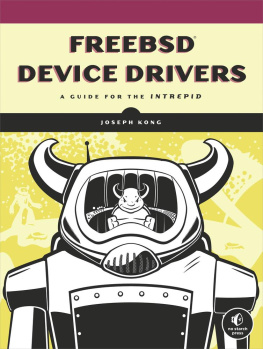
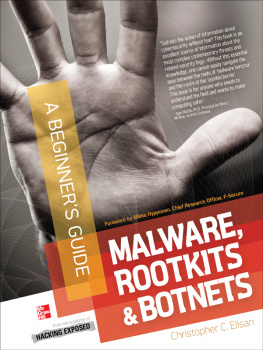

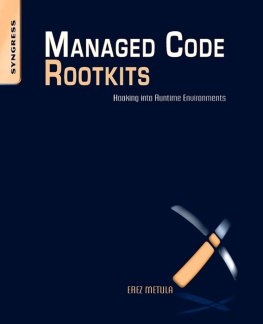
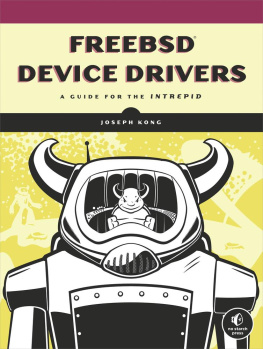

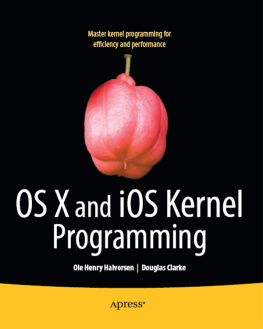

 Printed on recycled paper in the United States of America
Printed on recycled paper in the United States of America